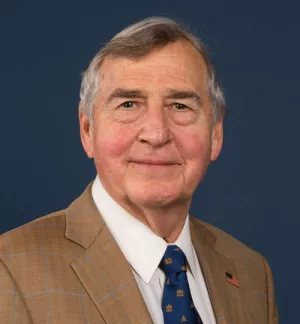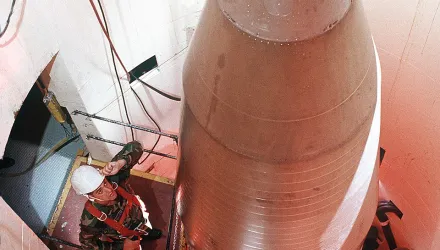Interview with Graham Allison on his book "Lee Kuan Yew: The Grand Master's Insights on China, the United States, and the World"
Lee Kuan Yew, the founding father of modern Singapore, has been referred to as a "Grand Master" by presidents, prime ministers and chief executives. Graham Allison from Harvard University has written a book on Lee, entitled "Lee Kuan Yew: The Grand Master's Insights on China, the United States, and the World," sharing the leader's insights on topics such as the rise of China and the new Chinese president, Xi Jinping, the result of 18 months of interviews.
Staff reporter Li Shen spoke to Allison during his latest visit to China to promote the Chinese version of his book, which is published by China CITIC press this month.
China.org.cn: What motivated you to write "Lee Kuan Yew: The Grand Master's Insights on China, the United States, and the World"?
Allison: I have been lucky enough to have known Mr. Lee Kuan Yew for a long time. I first met him in 1968 when he came to visit Harvard for a month after he had been prime minister for seven years. He has come back to visit me at Harvard a few times and I visited him in Singapore. It struck me that he had a rare strategic mind. He has great strategic insights on the future of China, the U.S. and globalization. I wanted to collect these nuggets in a nice thin book.
China.org.cn: What do you find most impressive about Lee?
Allison: Henry Kissinger said in the foreword to the book that Lee Kuan Yew is the smartest strategist he has ever met. That's why we have a section in this book called "When Lee Kuan Yew talks, who listens?" It includes comments from President Barack Obama, Bill Clinton, Jacques Chirac and President Xi Jinping. Each of them has listened to Lee Kuan Yew, but the rest of the world have not had the chance to listen to him. When you read the book, you feel like you are interviewing him.
China.org.cn: In this book, Lee said that he put China's President Xi Jinping in the same class as Nelson Mandela. What do you think about this?
Allison: Lee says that Xi has much a tougher personality than Hu Jintao. He knows both of them very well. Xi quietly worked his way up from the countryside to the central leadership. It has not been smooth sailing for him. That is why Lee classes him as a person with enormous emotional stability who does not allow his personal misfortunes or sufferings to affect his judgment. I think Lee has high expectations for Xi Jinping.
China.org.cn: In your opinion, what class is Lee Kuan Yew in?
Allison: He is clearly a strategic thinker. So in that way, he is similar to Henry Kissinger. He is also a father of a country. He took over a very small, corrupted and poor city state and made it into a high-level country with a higher income per capita than America, which is a great accomplishment. We asked him who he admires, and he answered Deng Xiaoping, for introducing market reform, Winston Churchill for not giving up, de Gaulle and Lincoln. I think he admires people who had overcome hardship.
China.org.cn: What is your observation on China's strategy of becoming number one in the world and coping with a rising China?
Allison: Lee Kuan Yew said that China's strategy of becoming number one is to out-produce, out-build and out–sell others. After that, it needs to protect its interests as the strongest economic power. According to Lee Kuan Yew, the U.S. needs to develop a strategy to cope with China's rise. He hopes that the U.S. will develop a strategy to share leadership in Asia with China. This would require the U.S. to adapt, because it is a rival power. He is optimistic about the U.S.-China relationship.
I personally think that the Chinese strategy so far has been very smart. Building the economy is good for the country and will make the Chinese proud. When China surpasses the U.S. in economic power and plays a bigger role in the region, which of course it will, I would say that we should avoid the 'Thucydides trap' ; whereby a rising power rivals ruling power. Historically, if you look in the last 500 years, it turned out very badly. Take World War One for example, Germany rose and rivaled Great Britain, and it ended in disaster. So the leaders of China and the U.S. need to be wiser.
China.org.cn: How will China and U.S. rebalance their respective foreign policies toward Asia if China becomes the dominant power in the region?
Allison: Economics determines a lot, but not everything. Lee Kuan Yew says that the Chinese expect Singaporeans to be more respectful of China as it grows more influential. He is very clear that Singapore has to be very flexible and ready to adapt.
China has become stronger and wealthier, much to the concern of America, and Asian countries like the Philippines, Korea and Vietnam. Lee Kuan Yew says that the U.S. has to get used to this change, even though it has never shared the world with a power of equal strength before.
But he says that China will not become integrated into the economic and security order established by the U.S. since World War Two. "China wants to be respected as China, not as an honorary member of the West." This requires the U.S. to adapt to it.
China.org.cn: According to Lee, "[China's] great advantage is its military not its economic influence." China is undertaking a new phase of economic reform which Western economists have called "Likonomics". In your observation, what are the opportunities and challenges brought by this round of reform?
Allison: I am very impressed with the management of Chinese economy and the economic policy. I think that the fact China's was able to sustain an annual growth rate of more than 7 percent during the global depression is amazing. But it is getting more difficult. I am looking forward to the announcement of the next "Five Year Plan". For example, the signal of investing in domestic consumption as a driver of economic growth and more opportunities for small and private enterprises compared to the state-owned ones. Both of the policies clearly make good sense. The Shanghai Free Trade Zone is a good example of showing being willing to adapt and adjust. The question will be whether the government is smart enough and powerful enough to make these adjustments because powerful vested interest groups will resist them.
China.org.cn: The Taiwan issue is one of the most challenging aspects of Sino-U.S. relations. During his meeting with Vincent Siew, honorary chairman of the Taiwan-based Cross-Straits Common Market Foundation, Chinese President Xi Jinping recently said that "we cannot pass these problems on from generation to generation." What do you think about this?
Allison: Lee Kuan Yew thinks that the mainland will be economically reunited with Taiwan. I think that Chinese leadership is very clever to choose an economic approach to reintegration, rather than a military one. I am impressed by Chinese government's patience on this issue. What the next step is whether there is a concrete idea about doing something sooner rather than later.
China.org.cn: Since the new generation of Chinese leadership came into power, it has launched a nationwide campaign to crack down on corruption, including sentencing high-level corrupt officials, such as Bo Xilai. How do you see this campaign?
Allison: Corruption is a huge problem in China, as the government said and the World Bank Transparency Report found. Lee Kuan Yew has been asked about this many times by leaders from other countries, because Singapore was once very corrupt. His advice was always the same: you have to find visible offenders and have to make an example of them. Obviously, China's problems are much greater than in Singapore, because China is a huge country while Singapore is really just a city. My bet is that Xi Jinping now sees the corruption as a big threat to the Party's rule. Lee Kuan Yew says in the book that corruption is a serious threat to the running of the Chinese economy.
Allison, Graham. “Sharing the World with a Rising China.” China.org.cn, October 16, 2013





